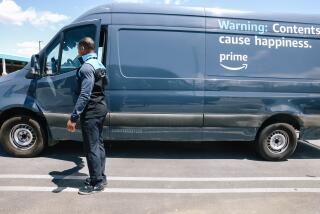Drug Tests for Rail, Airline Workers OKd : High Court Says Firms Don’t Need Unions’ Permission for Exams
- Share via
WASHINGTON — The Supreme Court ruled Monday that railroads and airlines may administer drug tests to employees without first negotiating the issue with their labor unions.
The 7-2 decision is the court’s first ruling on drug screening in the private sector and could affect hundreds of thousands of workers in the two industries.
Although Monday’s ruling was based only on interpretation of the federal Railway Labor Act, and is not likely to affect other workers in the private sector, it clearly shows that the court majority views mandatory drug testing as a relatively minor imposition on employees.
The high court said that adding a drug test to a routine urinalysis does not represent a major change in the union’s contract and therefore does not demand collective bargaining.
The decision allows rail companies to proceed with regular testing of about 275,000 train workers, and it will prevent unions from blocking the proposed testing of 500,000 employees of the airline industry.
Last year, the Transportation Department ordered the airline companies to prepare an extensive drug-testing program for pilots, flight attendants, security personnel and ground crews. By Aug. 18, the companies must submit their plans to the Federal Aviation Administration, and testing is to begin by the end of the year, an FAA spokesman said.
In March, the Supreme Court upheld government-imposed drug testing for workers whose jobs require them to operate dangerous equipment, carry firearms or combat illegal drugs.
Union attorneys argued that such testing violates the Fourth Amendment’s ban on unreasonable searches by government agents.
In a companion ruling handed down the same day, the justices specifically upheld a government requirement that train crews be tested for alcohol and drugs after an accident.
Meanwhile, the National Labor Relations Board reached an opposite conclusion in a decision announced Monday.
The board, in an interpretation of the National Labor Relations Act, said that a company may impose drug tests on job applicants, but not on existing workers without bargaining with the union.
Although the NLRB covers most union workers, employers remain free to challenge this conclusion in the federal courts and eventually in the Supreme Court.
The high court ruling Monday involved Conrail, the Consolidated Rail Corp., which cited a series of train accidents that were blamed on crew members’ impairment by drugs or alcohol when it announced in February, 1987, that it was adding a mandatory drug test to the employees’ annual physical examinations.
The existing contract between Conrail and its unions allowed for physical exams, but union lawyers said that the inclusion of drug testing was a major change that could not be implemented without the union’s approval.
Conrail disagreed, saying that the new tests were only a minor change under terms of the Railway Labor Act and could be implemented unilaterally by the company. After a federal appeals court in Philadelphia ruled for the union, Conrail appealed to the Supreme Court (Conrail vs. Railway Labor Executives, 88-1).
Justice Harry A. Blackmum said that Conrail’s action was “arguably justified by the terms of the parties’ collective-bargaining agreement” and therefore is not a major change in the contract itself.
The ruling leaves the unions with the option of filing a grievance against Conrail and requesting that an arbitrator stop the testing. Had the unions prevailed Monday, testing would have been stopped until the unions agreed to it.
“We’re disappointed, but not surprised,” said Lawrence Mann, a lawyer for the rail unions. “The voting lineup was the same as in March.”
Justices William J. Brennan Jr. and Thurgood Marshall dissented, as they did in the March ruling involving railroads.
Union officers opposed the new drug-testing program, Mann said, because “we didn’t get protections for accuracy and reliability.” Congress is considering legislation that will require a second test of positive samples, he said.
Conrail operates in the Northeast, but railroads around the nation have adopted similar drug-testing programs, lawyers said.
In other action Monday, the high court:
--Rejected the government’s appeal to reinstate the mail fraud conviction of former Maryland Gov. Marvin Mandel (U.S. vs. Mandel, 88-1759). Mandel, who already has been released from prison, won a lower court ruling overturning his 1977 conviction based on a 1987 Supreme Court decision on mail fraud. Government lawyers argued that the 1987 ruling should not be used retroactively.
--Struck down a Connecticut law requiring that the price of beer sold there be as low as in any neighboring state. On a 6-3 vote, the justices said that such a law interferes with interstate commerce (Healey vs. Beer Institute, 88-449).
APPEAL REJECTED--A mother can be tried for using only prayer to treat a dying child, the court ruled. Page 16.
More to Read
Sign up for Essential California
The most important California stories and recommendations in your inbox every morning.
You may occasionally receive promotional content from the Los Angeles Times.










